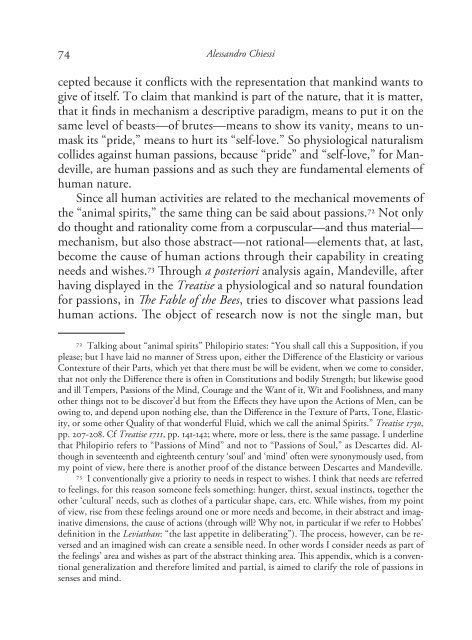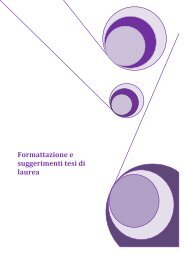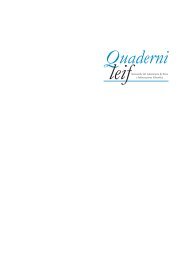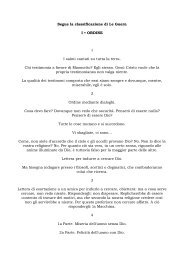qui - maria vita romeo
qui - maria vita romeo
qui - maria vita romeo
You also want an ePaper? Increase the reach of your titles
YUMPU automatically turns print PDFs into web optimized ePapers that Google loves.
74 Alessandro Chiessi<br />
cepted because it conflicts with the representation that mankind wants to<br />
give of itself. To claim that mankind is part of the nature, that it is matter,<br />
that it finds in mechanism a descriptive paradigm, means to put it on the<br />
same level of beasts—of brutes—means to show its vanity, means to unmask<br />
its “pride,” means to hurt its “self-love.” So physiological naturalism<br />
collides against human passions, because “pride” and “self-love,” for Mandeville,<br />
are human passions and as such they are fundamental elements of<br />
human nature.<br />
Since all human activities are related to the mechanical movements of<br />
the “animal spirits,” the same thing can be said about passions. 72 Not only<br />
do thought and rationality come from a corpuscular—and thus material—<br />
mechanism, but also those abstract—not rational—elements that, at last,<br />
become the cause of human actions through their capability in creating<br />
needs and wishes. 73 rough a posteriori analysis again, Mandeville, after<br />
having displayed in the Treatise a physiological and so natural foundation<br />
for passions, in e Fable of the Bees, tries to discover what passions lead<br />
human actions. e object of research now is not the single man, but<br />
72 Talking about “animal spirits” Philopirio states: “You shall call this a Supposition, if you<br />
please; but I have laid no manner of Stress upon, either the Difference of the Elasticity or various<br />
Contexture of their Parts, which yet that there must be will be evident, when we come to consider,<br />
that not only the Difference there is often in Constitutions and bodily Strength; but likewise good<br />
and ill Tempers, Passions of the Mind, Courage and the Want of it, Wit and Foolishness, and many<br />
other things not to be discover’d but from the Effects they have upon the Actions of Men, can be<br />
owing to, and depend upon nothing else, than the Difference in the Texture of Parts, Tone, Elasticity,<br />
or some other Quality of that wonderful Fluid, which we call the animal Spirits.” Treatise 1730,<br />
pp. 207-208. Cf Treatise 1711, pp. 141-142; where, more or less, there is the same passage. I underline<br />
that Philopirio refers to “Passions of Mind” and not to “Passions of Soul,” as Descartes did. Although<br />
in seventeenth and eighteenth century ‘soul’ and ‘mind’ often were synonymously used, from<br />
my point of view, here there is another proof of the distance between Descartes and Mandeville.<br />
73 I conventionally give a priority to needs in respect to wishes. I think that needs are referred<br />
to feelings, for this reason someone feels something: hunger, thirst, sexual instincts, together the<br />
other ‘cultural’ needs, such as clothes of a particular shape, cars, etc. While wishes, from my point<br />
of view, rise from these feelings around one or more needs and become, in their abstract and imaginative<br />
dimensions, the cause of actions (through will? Why not, in particular if we refer to Hobbes’<br />
definition in the Leviathan: “the last appetite in deliberating”). e process, however, can be reversed<br />
and an imagined wish can create a sensible need. In other words I consider needs as part of<br />
the feelings’ area and wishes as part of the abstract thinking area. is appendix, which is a conventional<br />
generalization and therefore limited and partial, is aimed to clarify the role of passions in<br />
senses and mind.








